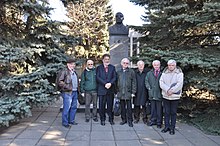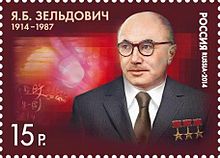Jakow Borissowitsch Seldowitsch

Yakov Borisovich Zel'dovich ( Belarusian Якаў Барысавіч Зяльдовіч , Russian Яков Борисович Зельдович * 8. March 1914 in Minsk , † 2. December 1987 in Moscow ), Yakov Borisovich Zel'dovich in English spelling, was a Soviet physicist . He played an important role in the Soviet atomic bomb project and in the development of nuclear weapons . Seldowitsch made great contributions to adsorption , catalysis , nuclear physics , particle physics , astrophysics , cosmology , general relativity and shock wave research .
life and work
His family moved to Saint Petersburg four months after he was born . They stayed there until August 1941, when they were evacuated to Kazan together with the institute at which Seldovich worked . They stayed in Kazan until the summer of 1943. Then Seldovich moved to Moscow.
In May 1931 Seldowitsch had become a laboratory assistant at the Institute for Chemical Physics of the Academy of Sciences of the Soviet Union - an institute with which he remained associated until the end of his life. In 1936 he wrote a thesis on adsorption and catalysis on heterogeneous surfaces. The most important point of this work was the investigation of the Freundlich adsorption isotherms . Seldowitsch discovered the theoretical basis of this empirical observation. In 1939 he wrote his doctoral thesis on the oxidation of nitrogen . He discovered its mechanism, known in physical chemistry as the "thermal NO mechanism" or " Zeldovich mechanism ".
Between 1937 and 1948 he worked on the theory of ignition, combustion and detonation. From 1939 to 1940, together with Juli Chariton , he developed the fundamental work on the theory of nuclear chain reactions for the Soviet Union . In 1943 he began to work on the Soviet atomic bomb project headed by Igor Kurchatov . He also worked with Andrei Sakharov and was subordinate to Chariton, the scientific director of the Arzamas ( Sarov ) secret laboratory . He worked on the development of nuclear weapons until October 1963.
In 1952 he began to work in the field of elementary particles and their interactions. He predicted the beta decay of pi mesons . Together with SS Gerschtein he developed (independently from Richard Feynman , Murray Gell-Mann , George Sudarshan , Robert Marshak in the west) the VA theory of the weak interaction , and in 1960 he predicted the muon-catalyzed deuterium fusion.
In 1977 Seldowitsch received the Kurchatov Gold Medal together with F. Schapiro , the highest honor for nuclear physicists in the Soviet Union. In 1958 he was admitted to the Academy of Sciences of the USSR. In 1972 he was elected a member of the Leopoldina , in 1975 he was admitted to the American Academy of Arts and Sciences , in 1979 to the National Academy of Sciences and the American Philosophical Society . In 1984 he was awarded the gold medal of the Royal Astronomical Society . In 1985 he received the Dirac Medal (ICTP) .
In 1965, Seldowitsch began researching astrophysics and cosmology , including the theory of the evolution of a hot universe, the properties of cosmic background radiation , the large-scale structure of the universe and the theory of black holes . He was the first to propose the discovery of black holes through the glow of incident matter from the environment and, together with Igor Dmitrijewitsch Novikow, was the first to propose the existence of primordial black holes. Together with Rashid Sunjayev , he predicted the Sunjayev-Seldowitsch effect .
Igor Kurchatov once called him a “genius” and Andrei Sakharov called him “a man of universal scientific interests”. Stephen Hawking once said to Seldowitsch: "Now I know you are a real person and not a group of scientists like Bourbaki ".
His son Boris Jakowlewitsch Seldowitsch was also a well-known theoretical physicist specializing in optics.

Honors
Since 2015 the Russian Academy of Sciences has awarded the Seldovich Gold Medal for outstanding achievements in the field of physics and astrophysics.
Fonts
- Selected works , 2 vols., Princeton 1993 (contributions to astrophysics in vol. 2)
- with Novikov Relativistic astrophyiscs , 2 vols., Chicago University Press 1971, 1975 (vol. 1 Stars and relativity, vol. 2 The structure and evolution of the universe), vol. 1 new at dover 1997
- with Raizer Physics of shock waves and high temperature hydrodynamic phenomena , 2 vols., Academic Press, New York 1966, 1967
- with Raizer Elements of gas dynamics and the classical theory of shock waves , New York, Academic Press 1968
- The mathematical theory of combustions and explosions , New York, Consultants Bureau 1985
- with Ruzmaikin, Sokoloff The almighty chance , World Scientific 1990
- Cosmology and the early universe , in Hawking, Israel General Relativity - an Einstein centennial survey 1979
- with Joseph Silk , Szalay The large scale structure of the universe , Scientific American, October 1983
- with Alexander Dolgov Cosmology and elementary particles , Reviews of Modern Physics 53 (1981) 1, pp. 1-41
- with Myshkis Elements of Mathematical Physics (Russian)
- Mathematics for Physicists (Russian)
- The universe was hot. In: Physics Journal. 24, 1968, p. 66, doi : 10.1002 / phbl.19680240204 .
literature
- Rashid A. Sunyaev (Ed.): Zeldovich: Reminiscences . Chapman & Hall / CRC, Boca Raton, FL 2004, ISBN 978-0-415-28790-6 .
- Dennis Overbye: Lonely hearts of the cosmos - the scientic quest for the physics of the universe . HarberCollins, New York 1991, ISBN 0-06-015964-2 ( archive.org ).
- Varun Sahni: Ya B Zeldovich (1914-1987) . Chemist, nuclear physicist, cosmologist. In: Resonance . tape 16 , no. 5 , May 2011, p. 409-427 , doi : 10.1007 / s12045-011-0047-7 .
- Ginzburg, VL: Yakov Borissovich Zel'dovich. March 8, 1914 - December 2, 1987 . In: Biographical Memoirs of Fellows of the Royal Society . tape 40 , 1994, pp. 430-426 , doi : 10.1098 / rsbm.1994.0049 .
- Vltalii I. Goldanskii: Ya. B. Zel'dovich (obituary) . In: Physics Today . tape 41 , no. 12 , 1988, pp. 98-102 , doi : 10.1063 / 1.2811670 (English).
- A. Sakharov: A man of universal interests . In: Nature . tape 331 , 1988, pp. 671 , doi : 10.1038 / 331671a0 .
- Andrei Sakharov: My life . Piper, 1991, ISBN 978-3-492-03259-9 .
Web links
- Yakov Borisovich ZELDOVICH. Moscow State University(English, Russian). (Pages dedicated to Zeldowitsch with biography, list of publications, etc.)
- Gershtein, SS; Zeldovich, YB ;: On Corrections from Mesons to the Theory of beta-Decay . In: Zh. Eksp. Teor. Fiz. tape 29 , 1955, pp. 698 (Russian). (Engl. in: On Corrections from Mesons to the Theory of beta-Decay . In: JETP . Band 2 , 1956, p. 576 , doi : 10.1142 / 9789812815941_0012 ( jetp.ac.ru [PDF]). )
Remarks
- ↑ In 1945 he was sent to occupied Germany as a captain to recruit scientists from the German missile project. Sakharov Mein Leben , Piper, 1991, p. 164
- ↑ member entry by Jacob B. Zel'dovic at the German Academy of Sciences Leopoldina , accessed on 2 April 2016th
- ^ Zeldovich, The fate of a star and the release of gravitational energy under accretion, Dokl. Akad. Nauk SSSR, Vol. 155, 1964, pp. 67-69. Reprinted in: Zeldovich, Selected Works, Volume 2, Princeton UP, p. 306ff, comment p. 310
- ^ Zeldovich, Novikov, The Hypothesis of Cores Retarded During Expansion and the Hot Cosmological Model, Soviet Astronomy, Volume 10, Issue 4, 1966, pp. 602-603
- ↑ M. Sasaki et al. a .: Primordial Black Holes - Perspectives in Gravitational Wave Astronomy, Classical and Quantum Gravity, Arxiv 2018
- ↑ "Now I know that you are a real person and not a group of scientists like Bourbaki". Quoted from VI Goldanskii: Physics Today 41 (1988) 12, p. 98
- ^ Seldowitsch gold medal. Russian Золотая медаль имени Я.Б. Зельдовича . Russian Academy of Sciences, accessed May 7, 2018 (in Russian).
| personal data | |
|---|---|
| SURNAME | Seldowitsch, Jakow Borissowitsch |
| ALTERNATIVE NAMES | Зельдович, Яков Борисович (Russian) |
| BRIEF DESCRIPTION | soviet physicist |
| DATE OF BIRTH | March 8, 1914 |
| PLACE OF BIRTH | Minsk |
| DATE OF DEATH | 2nd December 1987 |
| Place of death | Moscow |
